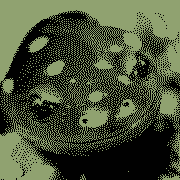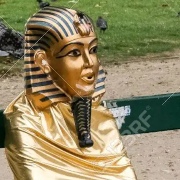|
I don't remember much about the lore of the souls games, but like, a bunch of ER spells to me kinda remind me of that tendency in manga I notice, of people talking around things. And the more I thought about it, the more I realized a lot of the lore in the game is about talking about or around pain and suffering without actually saying it. Like, once you put your own experiences into the bosses you are confronting, a lot of their motivations suddenly make a lot of sense and it's easier to fight them?
|
|
|
|

|
| # ? Jun 3, 2024 14:07 |
|
Wasn't there a famous Zen Buddist who achieved enlightenment watching some one else stuggle to cut bamboo or something? That's not too far off from having a realization from a modern mundane activity like a video game. Sadly my deepest meta though from a video game was Record of Lodoss War and it wasn't very Buddhist. In brief, the player character was ressurected from the dead to kill the villian of the game. As the villian is mortally wounded she mocks the hero telling him since he fullfilled his purpose in defeating her, he has no reason to continue living and will return to death shortly as well. And it was rather true; I'd done all the side quests and bonus bosses before the main villian. So having beaten the game there was no reason to go back or keep playing, thus the hero did "die" in a sense.
|
|
|
|
Since we're discussing ways in which people attained enlightenment, I'm curious about something. Apologies if this is a dumb question. So according to tradition, Buddha attained enlightenment by meditating for 40 days beneath the Bodhi tree. It's also said that he was born into royalty and that, presented with a fortune saying he would either be a great general or a great spiritual leader, his father cut off his access from the world and from spiritual teachings. He did explore some spiritual avenues between leaving home and becoming the Buddha, but it's not like he was raised from a child to be a great prophet or whatever--in fact he was raised to be the direct polar opposite of that. My question is this: what made Buddha special that he was able to attain enlightenment by meditating for 40 days without ever hearing the dharma? Why do monks spend their whole lives following the noble eightfold path and still fail to be enlightened? What's stopping me, a person with no spiritual teaching outside of a childhood in an evangelical Christian church from plopping myself down underneath a tree for a month and change and becoming enlightened? quiggy fucked around with this message at 20:51 on Aug 31, 2023 |
|
|
|
Three things, I think. First is the preceding lives acts that created Shakyamunis conditions of existence. Second would be the impressions of his preceding times in that life which actually included some hardcore asceticism. It wasn’t just dabbling. The third is that we obviously aren’t due for Maitreya  However there are paths towards buddhahood in many sects, and starting a regular sitting practice would definitely help you with the challenges of life, barring specific issues that might interfere.
|
|
|
|
|
quiggy posted:What's stopping me, a person with no spiritual teaching outside of a childhood in an evangelical Christian church from plopping myself down underneath a tree for a month and change and becoming enlightened? Gotta play to find out! He did actually do rounds with all the popular meditation teachers of the time though, learning all the various stages of meditation and jhanas, and realizing that that jhanas didn't actually lead to the ultimate cessation of suffering, instead being just a temporary pause. But the Buddha also had a zillion lifetimes of preparation, so a better person to think about I think is Milarepa. He was just a guy, a student of Tilopa, and when he was asked as a last teaching how he managed to attain, he mooned his student. This wasn't just a rude gesture, but in fact a lesson: his rear end was hard and calloused from sitting long days in meditation. He worked for it. But there's no tulku of Milarepa. There's no history on his many lifetimes before. He's a dude who worked hard and got enlightened. So what's stopping you from attaining enlightenment? The short answer is basically "you." But you can definitely do it if you try. We're talking about Fromsoft games, so enlightenment is like a fromsoft boss. Before you know about Balteus it's no problem. When you encounter Balteus it's a pain in the rear end. You might wonder if you even want to bother. You look around and it seems like other people are doing it easily. But if you keep trying, learning, practicing, figuring out what's working and what's not working? You'll get it.
|
|
|
|
Elden Ring kind of answers that question actually. There's always three ways to navigate the game. I used to use the waypoint system, but I noticed I stopped following my own goals after awhile trying to progress. So I decided to hit landmarks. The minor erdtrees, the big castles, etc. Still ended up getting sidetracked along the way. Then I realized after a long while, I'd been following the flowers. Elden Ring uses Japanese flower imagery absolutely everywhere. You can tell not just how many people died in an area based on how many fields of flowers are around, but also, how they might have died, based on flower color. So, the big battlefield outside Leyndell proper is full of red flowers, for all the soldiers who died in battle, with a spattering of white for people who got hit by catapults and died instantly. There is an entire third part of the plot that the game never tells you about but that your eyes are seeing the entire time. With this in mind, I remade my character to be, well, myself. Bandit class, dinky little knife and bow. You basically can't kill anything worth a drat in the starting area except sheep and birds and other critters. So I keep doing that, and craft more, and explore further out, and keep building up a stockpile to go out further and further. I turn off the background music, the game's ambience is really chill. I don't even use the map anymore, I just go based on landmarks. And the game is that well made that you can do that. So my answer to your question, the Buddha achieved enlightenment by realizing he could have sat down and touched grass anytime he ever wanted in his life.
|
|
|
|
quiggy posted:So according to tradition, Buddha attained enlightenment by meditating for 40 days beneath the Bodhi tree. It's also said that he was born into royalty and that, presented with a fortune saying he would either be a great general or a great spiritual leader, his father cut off his access from the world and from spiritual teachings. He did explore some spiritual avenues between leaving home and becoming the Buddha, but it's not like he was raised from a child to be a great prophet or whatever--in fact he was raised to be the direct polar opposite of that. Before his enlightenment, he recalled a kind of meditative state he had as a child (while sitting and watching people do archery iirc) and used that as part of tools that lead to enlightenment. So in way, he did have some spiritual tools before leaving the palace, it just took him a while to realize it. And this sort of thing pops up in Zen traditions, like the idea of the "beginners mind". In a way, it is best not to over complicate things, and try to see things with as little prejudice as possible. quote:My question is this: what made Buddha special that he was able to attain enlightenment by meditating for 40 days without ever hearing the dharma? This isn't all that unusual in Buddhism. There is the concept of the Pratyekabuddha. Your classical hermit on a mountain who discovers enlightenment. What distinguishes that from The Buddha, was that the Buddha taught the path, while a Pratyekabuddha doesn't. They just keep it to themselves for whatever reason. quote:Why do monks spend their whole lives following the noble eightfold path and still fail to be enlightened? Honestly, a lot of them don't follow the eightfold path. They may follow parts of it. They may follow none of it, and just take the vows because it is a cultural custom. Some sects think enlightenment is no longer possible, and don't do any sort of requisite practice. quote:What's stopping me, a person with no spiritual teaching outside of a childhood in an evangelical Christian church from plopping myself down underneath a tree for a month and change and becoming enlightened? All you need is the will to do it and a clear view of the path it takes to get there.
|
|
|
|
Thich Nhat Hanh would frequently follow up any discussion of "enlightenment" with the question, "Enlightened of what?" I think he was trying to encourage his students to move away from thinking of enlightenment as a some kind of fuzzily-defined, almost magical state into something more grounded in the experience of obtaining an insight. So he would say that the Buddha was enlightened of the four noble truths and of the reality of impermanence, non-self, and no-birth-and-no-death rather than to say that Gautama Buddha was just generally "enlightened", although that is what the simple title suggests. I find this instruction helpful in demystifying the Buddha's story, which is very much a Plum Village (and perhaps Zen in general?) practice. I've also heard multiple Plum Village monastics say that the enlightenment is the relatively easy part, and practice is the hard part. My own personal experience and observations agrees with this. With the vast library of teachers available to so many people these days, it seems easier than ever to grasp what it is that the sages mean when they talk about things like no-self and no-coming-and-no-going. The much harder part is to effectively practice with those insights and their implications. It is very easy to know what is meant by no-self but then to backslide into dualistic thinking when confronting a source of suffering that one wishes to externalize and keep external, or to hold onto an internalized source of pain because letting go seems more painful than nurturing it.
|
|
|
|
The Heart Sutra really cuts straight to the chase, doesn't it? "Ill-being, the Causes of Ill-being, the End of Ill-being, the Path, insight and attainment, are also not separate self entities. Whoever can see this no longer needs anything to attain."
|
|
|
|
There is a big difference, I think, between knowing something in the sense of "I could answer a test question on this topic quite easily, and get high marks," or even in being able to use the idea if you were engaging in philosophical thought, and knowing it the way that you know up is down. I wouldn't call any of this access to information a mistake, but I suspect it might make certain habits of thought ("collect books! read another book! that'll save me!") easier for us than to a guy farming rice in the Muromachi period. Caufman posted:Thich Nhat Hanh would frequently follow up any discussion of "enlightenment" with the question, "Enlightened of what?" I think he was trying to encourage his students to move away from thinking of enlightenment as a some kind of fuzzily-defined, almost magical state into something more grounded in the experience of obtaining an insight. So he would say that the Buddha was enlightened of the four noble truths and of the reality of impermanence, non-self, and no-birth-and-no-death rather than to say that Gautama Buddha was just generally "enlightened", although that is what the simple title suggests. I find this instruction helpful in demystifying the Buddha's story, which is very much a Plum Village (and perhaps Zen in general?) practice.
|
|
|
|
|
For me, enlightenment was when I understood what 草生えた meant but not what was in my av.
|
|
|
|
Nessus posted:I don't disagree with this, and I love Plum Village, but I wonder: Demystifying of what? But this just may mean that I'm outside of the exact space to which Thay and Plum Village address: to me, the prospect of Buddha as a fully enlightened being with transcendent vision and understanding, and that being a place that "I" (in so far as there is an "I") might, in many lifetimes, reach, is inspirational; but I can easily see how to many others, perhaps far more, it would seem discouraging and would just reinforce a binary with them on the bad side of it. Cephas posted:The Heart Sutra really cuts straight to the chase, doesn't it?
|
|
|
|
nice obelisk idiot posted:
Well read all 20,000 pages of the perfection of wisdom sutras of the synopsis isn’t in depth enough for you
|
|
|
|
I wasn't complaining about the depth, more like complaining about myself re:the depth. I shouldn't be so disrespectful, sorry. I have meditation-induced sleep changes but have not been meditating recently and it's a bad combo.
|
|
|
|
I am just constantly amazed at how much better I feel when I meditate regularly Back to the Lotus Sutra. A giant jewel covered stupa appeared out of the ground to listen to the teaching of the Lotus Sutra. It has an old dead Buddha in it and of course folks wanted to see him! So the Buddha made all parts of himself appear, may have cleared some Buddha land out and flattened it to accommodate them, and they said yeah let's see him! So the Buddha went to him and there he was all basically not dead and long rotten and dried out. Even made space for the Buddha to sit next to him! Not going to pretend I'm understanding all this. I will say it's impressive how the Lotus Sutra itself is a character in the Sutra, unlike all the other 5 or however many I have read so far.
|
|
|
|
|
Bilirubin posted:I am just constantly amazed at how much better I feel when I meditate regularly Lotus sutra is challenging and changing the idea that the Buddha attained parinirvana . Since lotus sutra says that nirvana is actually impossible until all beings attain nirvana it has to account for the obvious counter argument of “the Buddha attained nirvana” Part 1 of the us the Buddha explaining that nirvana was a trick to get people to pursue the path who would not have if they knew they would have to save everybody instead of just themselves Part 2 is the Buddha just bringing a past Buddha incarnation so that you can know oh actually all the buddhas are still there. They’ve all played this trick and they’re still present and can affect the world
|
|
|
|
Awesome thanks! I have a couple commentaries ready to read next for when I finish the Sutra proper. I am loving the cosmology however
|
|
|
|
BIG FLUFFY DOG posted:Lotus sutra is challenging and changing the idea that the Buddha attained parinirvana . Since lotus sutra says that nirvana is actually impossible until all beings attain nirvana it has to account for the obvious counter argument of “the Buddha attained nirvana” On a more theologically grounded level there's the comment in the Ksitigarbha sutra by Shakyamuni that even he (axiomatically able to know all things) could not enumerate the number of beings saved by Ksitigarbha's works. I took this to suggest that it's a constantly expanding exponent as new beings arise and receive Ksitigarbha's positive influence, etc. etc.
|
|
|
|
|
Nessus posted:I've wondered sometimes about this because it seems to suggest that nirvana is in fact fundamentally impossible since beings will continue to arise, although we may reasonably expect bodhisattvas to arise more and more as well. Is there some sort of bodhisattva singularity that will produce a buddha-hole? I think this was in a Masamune Shirow manga. (after a crash course in the entirety of meditative practice- first two chapters here: https://www.kalavinka.org/book_excerpts/SGS_excerpts/SGS_X-08_Pref_Chapters.pdf): quote:Through relying on these dhyānas, the bodhisattvas realize the nice obelisk idiot fucked around with this message at 23:39 on Sep 4, 2023 |
|
|
|
Video games: There's an old adventure game (I can't remember which) where you're given access to a "wish" feature in the last act. One of the options you're given is "eternal life." If you pick it, the game will cheerfully and helpfully transition into an unwinnable state, so you don't have to worry about finishing it. Aside from that -- have you all seen Rain World? You might enjoy it!
|
|
|
|
Interesting article on Buddhist temples and finance in Asian history: https://www.asianstudies.org/public...dern-east-asia/ Thanks to the ancient history thread!
|
|
|
|
|
I had to put my cat down today. He had lymphoma in his intestines and when they put him on IV fluids it began to leak into his chest. He was doing okay when it happened because they'd drained the fluids, but it was gonna happen again soon. We'd wanted to give him a bit more time so my SO could return from a conference, but we realized that would only be selfishly prolonging his suffering. That said, I still feel a profound guilt. Guilt that I didn't take him in sooner for fear that he was just being picky with food. Guilt that I didn't give him the chance to say goodbye to my SO, who he loved more than anything. Guilt that I didn't love him enough or contributed to his stress by getting him some siblings who he had a complicated relationship with. I wish I could be sure that there was an afterlife or rebirth waiting for him, but I'm not, and that makes it hard too. He was 14, so I knew it would happen soonish, and I know change is inevitable, but while I was holding him before they came, and he purred for the first time in a couple days, I wished that, just once, a moment could last forever.
|
|
|
Hiro Protagonist posted:I had to put my cat down today. He had lymphoma in his intestines and when they put him on IV fluids it began to leak into his chest. He was doing okay when it happened because they'd drained the fluids, but it was gonna happen again soon. We'd wanted to give him a bit more time so my SO could return from a conference, but we realized that would only be selfishly prolonging his suffering. I'm so sorry. Its the worst part of having a pet. I'm glad you had that last good moment together. My dog is 14 and has been having health problems for the past year or so too, we aren't where you are now but its soon to come.
|
|
|
|
|
I’m so sorry for your loss. It sounds as though you gave that cat a full and happy life. I think caring for pets is a common way to cultivate compassion even if we aren’t setting out to do so.
|
|
|
|
|
It's such a cliche with grief, but it feels so weird that the world keeps on going even when you feel everything should stop. Part of me feels this reflects poorly on my path as a Buddhist; I know euthanasia isn't viewed very highly, and there's the "Buddhist-convert-from-Christianity" thing where intense attachment feels like a sin. That said, I hope I can take this moment to be more compassionate to others, if only as the tiniest sliver of a silver lining.
|
|
|
|
Imo it reflects well on you even if the context is very, very difficult. You will feel many things. Just try not to cling. Remember the little guy with love and allow your pain to exist.
|
|
|
|
|
Personally, and this isn't a super Orthodox view, but I think euthanasia of animals and people who want it is compassionate and merciful and reduces suffering. We shouldn't rejoice in it. The purring of the cat like they haven't done lately in the moments before evokes a deep sense of mono no aware to me, a beautiful and tragic image that shows the transience of life. A euthanized animal in a companion's arms may have less fear at the time of death and thus a better chance at a better rebirth. In Orthodox contrast, I have no doubt in rebirth and that your friend will be reborn and eventually be liberated from suffering. Om Ami Dewa Hrih
|
|
|
|
I read these verses at the beginning of Jacob L. Moreno's Psychodrama, and they struck me as a supremely perceptive thing to say. I would say supremely Buddhistic, although he was Jewish and had a secular early social-scientific and Jewish contextual understanding of these things.pre:In the place of the imperative steps the imperator.
In the place of the creative steps the creator.
A meeting of two: eye to eye, face to face.
And when you are near I will tear your eyes out
and place them instead of mine,
and you will tear my eyes out
and will place them instead of yours,
then I will look at you with your eyes
and you will look at me with mine.
Thus even the common thing serves the silence and
our meeting remains the chainless goal:
The undetermined place, at an undetermined time,
the undetermined word to the undetermined man.
quote:God is spontaneity. Hence, the commandment is: "Be Spontaneous!" Two weeks after reading that, I happened to poke around in Kunzang Pelden's commentary on Shantideva's Bodhisattvacaryāvatāra (there's a googleable pdf of the work). He saw this as an essential practice, and outlines some meditation strategies regarding it. Of course it is in the moment, and everyone who is trying tries to put themselves in the shoes of others. But specifically training to break out of social habit energies, in step with training in compassion in meditation seems to be super useful. At any point in practice. I think that it can also help foster self-compassion and clearer thinking when facing difficulties. Recently, I happened to be close to some atrocious suffering in others in a way that I have been isolated from for a while. I found myself turning away emotionally more than I would have liked. The specifics hit a little close to home. It set off some less than charming defenses internally, like otherizing the people in question for not managing or hiding something as well as I did, when I should have been relating to it deeply. Which is understandable and I need compassion for myself as well, but this is certainly something that I need to work on. Just some thoughts. I like seeing activity in this thread.
|
|
|
|
Paramemetic posted:Personally, and this isn't a super Orthodox view, but I think euthanasia of animals and people who want it is compassionate and merciful and reduces suffering. We shouldn't rejoice in it. The purring of the cat like they haven't done lately in the moments before evokes a deep sense of mono no aware to me, a beautiful and tragic image that shows the transience of life. A euthanized animal in a companion's arms may have less fear at the time of death and thus a better chance at a better rebirth. yeah idk what would be wrong with euthanasia unless it's, like, done out of laziness instead of compassion, but that doesn't seem to be even remotely the case here
|
|
|
nice obelisk idiot posted:Recently, I happened to be close to some atrocious suffering in others in a way that I have been isolated from for a while. I found myself turning away emotionally more than I would have liked. The specifics hit a little close to home. It set off some less than charming defenses internally, like otherizing the people in question for not managing or hiding something as well as I did, when I should have been relating to it deeply. Which is understandable and I need compassion for myself as well, but this is certainly something that I need to work on.
|
|
|
|
|
Hello, Buddhism thread. Ever since my religions of the world class in college I have been interested in exploring this. We are going through a very tough family time right now (everyone is safe and loved and cared for, just tired frustrated unhappy) and literally my only memory of "what Buddhism is about" is the idea that the basis of all unhappiness is a desire to be happy, which I assume is somewhere between way too simple and outright wrong. But the idea itself doesn't turn me off and is in fact fairly comforting. I've been a Methodist-practicing atheist my whole life (wife is a church musician), and I like Methodism for a lot of its stances and beliefs, I just have never been able to coax myself to feel anything about Christianity. So ... how to I start? I read the OPs (and am going to go back and read them again) and would welcome a book, Buddhism for Dummies but less stupid; there are some temples within a half hour of me, some look more like gyms with paid memberships (??) or something. Maybe that's common and normal. I've never felt inclined to reach out for anything like this before, I always sort of assumed my heart wasn't built this way, but something is pulling me the past few months. Thank you.
|
|
|
|
What the Buddha Taught by Walpola Rahula Thero is a good introductory book on Buddhism.
|
|
|
|
Oh nice, I hadn’t read that one. Is it online? Heart of the Buddhas Teaching is also good. As for happiness and unhappiness: I would say it’s nearer to the unsatisfactory and transient nature of even good times. The ultimate goal is liberation from the suffering that arises from that truth, which is possible. In my experience, following the path eases sorrow and redoubles joy, so it’s worth some exploration by almost anyone.
|
|
|
|
|
Cephas posted:What the Buddha Taught by Walpola Rahula Thero is a good introductory book on Buddhism. I've been reading through this and enjoying it a lot (because of your recommendation actually.) There is a lot of technical language in it though, so I would follow the introduction's instructions on what order to read things in rather than going through it linearly. Another popular entry point (and mine personally) is Zen Mind, Beginner's Mind, which introduces the basics of practicing meditation as well as some thoughtful and easy to read lectures which I found helpful for opening up my mind and inspiring me to be more compassionate to myself and others.
|
|
|
|
Huxley posted:Hello, Buddhism thread. Ever since my religions of the world class in college I have been interested in exploring this. We are going through a very tough family time right now (everyone is safe and loved and cared for, just tired frustrated unhappy) and literally my only memory of "what Buddhism is about" is the idea that the basis of all unhappiness is a desire to be happy, which I assume is somewhere between way too simple and outright wrong. But the idea itself doesn't turn me off and is in fact fairly comforting. I started practicing zazen with a similar word-of-mouth understanding of Buddhism as you, what with the root of suffering being desire quote many of us have heard before. The longer I've been with my teacher and the more I've read though, I've seen that Buddhist teaching is often not "just so" or possible to package into a single sentence. The reason why we practice, learn about the noble truths, or follow the precepts, it is about cultivating awareness of ourselves and our surroundings rather than grokking lessons and carrying them in an inert unchanging state. So if you think the idea that desire causes suffering is too simple or outright wrong, I actually think that you're well primed to throw yourself into this and really interrogate what suffering is, what your suffering originates from. I hope that it helps you, and that it extends to your family. I'll be happy to see you post again if you do
|
|
|
|
Huxley posted:So ... how to I start? I read the OPs (and am going to go back and read them again) and would welcome a book, Buddhism for Dummies but less stupid Cephas posted:What the Buddha Taught by Walpola Rahula Thero is a good introductory book on Buddhism. ^Seconding this [there is lots of Pali terms but they are defined and worth learning if serious] I also liked Buddhism for Beginners - Thubten Chodron; it's purely Q&As but was good to just skip around. Huxley posted:there are some temples within a half hour of me, some look more like gyms with paid memberships (??) or something. Maybe that's common and normal. Dhamma transmission is offered freely; be weary of any "paid memberships"
|
|
|
|
Virgil Vox posted:
Seconded. My teacher does Kong an with me for no charge and has told me one of the reasons it's important to have a recorded lineage of who taught who is to make sure somebody isn't using Buddhism aesthetics to scam you
|
|
|
|
Thank you all, "What the Buddha Taught" is on its way. I was also a little wary of "pay to pray" type places and it's nice to have that validated. I'm excited to start learning! And thank you for the family concerns.
|
|
|
|
Huxley posted:Thank you all, "What the Buddha Taught" is on its way. I was also a little wary of "pay to pray" type places and it's nice to have that validated. Late to this, since it's been ages since I logged in. In case it's of interest (and it may well be given your perspective), I'd like to offer up a few Soto Zen links and suggestions, starting with my post near the start of the thread: Red Dad Redemption posted:Ok here are a few starter links for Soto Zen. We always used to like to recommend Opening the Hand of Thought as a starter book for Soto Zen, and for me and many others Uchiyama's How to Cook Your Life is a favourite, though the latter improves with a bit of background on Zen. Also, I don't know if you have a sangha nearby, but should Zen be of interest, Ancient Dragon Zen Gate in Chicago is led by the excellent, and prolific, Taigen Leighton, and has a podcast that includes all of his dharma talks, as well as online sits nearly daily, with the main one on Sundays. https://www.ancientdragon.org/
|
|
|
|

|
| # ? Jun 3, 2024 14:07 |
|
Leighton is a very gifted translator, too.
|
|
|





























